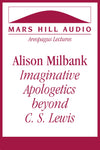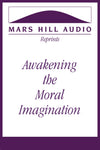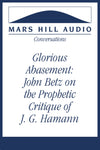Sound thinking
The story of the demotion of stories
by Ken Myers

In the Introduction to his 2010 book, Faith, Hope and Poetry: Theology and the Poetic Imagination (Ashgate, 2010), Malcolm Guite makes the case for poetry “as a redress or a restoration of lost balance in vision” in Western culture.
“In order to discern why modern Western culture has lost vision, why there is an imbalance that needs to be redressed, we have to look back to the great cultural shift that occurred during the Enlightenment, ushering in a mistrust and marginalization of imaginative and poetic vision and a particular suspicion of the ambivalence or multivalent language of poetry. Instead of acknowledging, as many thinkers do now, that the way we know, the language through which we know, may be an essential and helpful part of knowledge itself, some philosophers of the Enlightenment thought that image and imagination simply clouded and obscured the pure dry knowledge that they were after. This attitude is often traced back rhetorically to Francis Bacon, who wrote that: ‘For all that concerns ornaments of speech, similitudes, treasury of eloquence, and such like emptinesses, let it be utterly dismissed.’ Nonetheless Bacon himself cannot say anything without constantly availing himself of metaphor and symbol, nor can there be any scientific discourse without it. . . . Others would trace this splitting of knowledge to Descartes’s dividing of the world between res extensa and res cogitans, a dualism from which science and philosophy are only just recovering. It is not my purpose to pursue this split to its ultimate philosophical source but rather to observe the ways in which it became current, affected the way people thought, wrote and read, and continues to affect them still. For this purpose it is better to look at more influential texts, which popularized the thought of Bacon and Descartes. The formation of the Royal Society was absolutely central to the development of English life and thought in and through the Enlightenment, and the Royal Society took a clear stand against poetry and the poetic imagination as ways of coming at truth. And here Thomas Sprat’s History of the Royal Society — really its manifesto — is a seminal text. Spratt urged his readers ‘to separate the knowledge of Nature, from the colors of Rhetoric, the devices of Fancy or the delightful deceit of Fables’.
“This advice, indeed the whole Enlightenment project that it represents, is in very sharp contrast to the wisdom of the previous age, which was rooted in the idea that fables, stories and myths were the medium that most completely embodied the deepest truths we need to know. Thus most of the wisdom of the ancient world, both Judeo-Christian and Classical, was embodied in myth, story and song. The notion of telling a fable in order to get at a truth went very deep indeed, and emerges, for example, even in the lighthearted exchange between Audrey and Touchstone the fool in As You Like It, though it should be said that Shakespeare, with a true understanding of the cross, always puts his greatest wisdom in the mouths of fools:
“Audrey: I do not know what ‘poetical’ is. Is it honest in deed and word? Is it a true thing?
“Touchstone: No, truly; for the truest poetry is the most fainting . . .
“Sprat’s attack was not only on story but also on the poetry of image and metaphor; he goes on to demand:
“a close, naked, natural way of speaking, positive expressions, clear senses, a native easiness, bringing all things as near the mathematical plainness as they can, and preferring the language of the artisans, countrymen and merchants before that of wits and scholars.
“The new philosophers and scientists had declared war on the imagination, and the consequence of that war was a kind of cultural apartheid: the entire realm of ‘objective’ truth was to be the exclusive terrain of Reason at its narrowest — analytic, reductive, atomizing; and the faculties of Imagination and Intuition, those very faculties that alone were capable of integrating, synthesising and making sense of our atomized factual knowledge, were relegated to a purely private and ‘subjective’ truth. If it cannot be weighed and measured, these men were saying, it is not really there. How prophetic Blake, the great rebel against this division, was when he wrote:
“‘What’, it will be Question’d, ‘when the Sun rises, do you not see a round disk of fire somewhat like a Guinea?’ Oh no, no, I see an Innumerable company of the Heavenly host crying, Holy, holy, holy is the Lord God Almighty.
“It was not just poetry that was under attack. This new arrangement affected everything, including the Christian faith, which was forced to choose sides in this divide, either to be relegated to something subjective, not there, essentially made up, or to become a pseudo-science, reducing the great mysteries embedded in the ancient story-telling of Scripture to quantifiable exactitudes, patient only of a literal interpretation. Theology felt itself forced to choose between an increasingly vague and amorphous liberalism, happy to keep reinventing the faith, and an increasingly strident fundamentalism, which tries to treat the vast subtle poem of Scripture as a single scientific treatise whose every word is literally and only literally true. As Coleridge brilliantly expressed it, writing in the early nineteenth century when this process was already well underway:
“A hunger-bitten and idea-less philosophy naturally produces a starveling and comfortless religion. It is among the miseries of the present age that it recognizes no medium, between Literal and Metaphorical. Faith is either to be buried in the dead letter, or its name and honours usurped by a counterfeit product. . . .”
Malcolm Guite talked about Coleridge’s belief that the mind of the Creator and the minds of God’s image-bearers share an essential correspondence on Volume 144 of the Journal.







